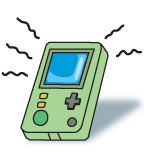Space batteries!

The new lithium-ion (Li-ion for short) batteries recently tested in space are SO good and SO long-lasting . . .

if you put them in your hand-held electronic game, you might never have to buy batteries again!
Find out just how long your Li-ion batteries would last:
How nice that we don't have to plug everything into the wall to get electricity!

But batteries often die at just the wrong time. Flashlights fade away when you need them most. Toys that keep going and going... do finally quit.
Wouldn't it be nice to have batteries that last many years?
One place such a battery would be very handy is in a spacecraft. Most spacecraft do not have people onboard. If the batteries fizzle, the whole spacecraft fizzles. There is no one to replace the batteries in a spacecraft that's millions of miles away!
Even though batteries may work fine down here on Earth, space is another matter . . . or rather, lack of matter!

In space, batteries must work in both very hot and very cold conditions. They must withstand a lot of radiation from the Sun. They must work in a vacuum without leaking or blowing up! They must be rugged enough to withstand the severe vibrations of a rocket launch.
Batteries now being used in space are the rechargable kind, usually nickel-cadmium (or Ni-Cad). They are recharged by solar cells that convert the sun's energy to electricity. However, these batteries eventually wear out and no longer can be recharged.
Lithium-ion (or Li-ion) batteries are a newer kind. The chemicals inside them that store the energy are different from Ni-Cad batteries. Li-ion batteries store a lot more energy in a smaller space. What's more, Li-ion batteries can be recharged many more times.



